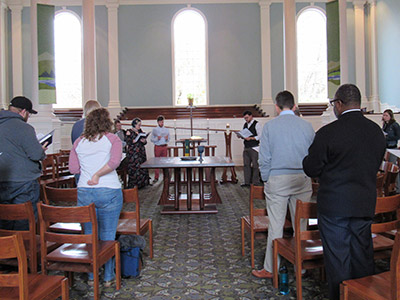PTS Launches Three Houses of Study
Pittsburgh Seminary students now have another way to engage more deeply with their own faith traditions while also relating to other ecclesial families. In the 2021 spring semester, the Seminary launched three Houses of Study—Presbyterian, Episcopal/Anglican, and Ecumenical.
The Houses are an outgrowth of the recent curriculum redesign and were established to provide specific learning environments where students can deepen their capacity to reflect theologically upon their denominational traditions and further develop their sense of vocation.
“Nobody ministers on their own,” said the Rev. Dr. Edwin Chr. van Driel, Directors’ Bicentennial Professor of Theology. Through our Houses of Study and the wider Ecclesial Formation program, PTS both prepares students to serve a particular community and forms them in an awareness of their larger denominational and ecumenical context and calling. Our goal is to help them become deeply rooted in their own traditions and apprenticed to their own communities, but also to fall in love with the church’s catholicity and to be changed in encountering Christians from a wide variety of backgrounds and walks of life.
The connected Ecclesial Imagination course, offered in the January term, allows students within ecclesial families to look broadly at topics such as baptism, ordination, and church division and unity. Then the groups come together to explore what their faith traditions have in common and what can be learned from their differences.
“The Ecclesial Imagination course and Ecumenical House of Study have been spaces which, rather than erasing my particular experiences of and convictions about church, have invited me both to better articulate these and to charitably and seriously open myself to the convictions and experiences of people standing in traditions which shine forth God's light differently,” said MTS student Sarah Betzig. “Both the house and the course have led me to consider anew my experiences, hopes, wounds, expectations, and perceptions of ‘church’ and to hear and be heard by others of different ecclesial backgrounds as I do so, which has been incredibly enriching.”
In addition to student participants, the Houses of Study include a pastor/mentor team identified and approved by the local judicatory and are convened in conjunction with the Rev. Ayana Teter, associate dean for students and formation.
“The Houses are rooted in the rich and vital relationships that exist between PTS and local denominational partners,” said Ayana. “They provide denominational resources, Christian community, and ecclesial formation tailored to the ongoing needs of local judicatories. Monthly gatherings include time for fellowship, topical spiritual reflection, guest speakers from within the House’s denominational tradition, rest, and preparation in judicatory-specific ordination requirements.”
In preparing to launch these Houses and in talking with bishops, executive presbyters, and other judicatory leaders, the Seminary found that each ecclesial partner has a different tradition around what they want to see in student formation—ecclesial, theological, pastoral, and spiritual. The monthly gatherings allow time for a combination of what judicatories want students to know, what pastoral mentors feel passionate about regarding student formation, and what students need: curiosity about the tradition into which they are called to serve, pastoral identity and leadership development, practical preparation for passing applicable ordination exams, conversations about broader ecclesial topics, access to excellent pastoral mentors, and space for personal reflection and pastoral formation.
House leadership includes the Revs. Trent Hanock, Charissa Howe ’14/’16, and Dirk Lesnett (Presbyterian), the Revs. Cathy Brall and Charles Fischer (Episcopal/Anglican), and the Revs. Liddy Barlow and Terry Tim ’85 (Ecumenical). “These mentors are creative and passionate about the church being a vibrant, prophetic witness in the world today. They provide thoughtful leadership in their local communities about work to make the church a better place,” said Ayana.
These Houses were established based on student population, denominational partnerships, and existing structures. As the Seminary continues to think about context as a learning partner, relationships with regional ecclesial bodies will deepen and new Houses of Study will be organized.

